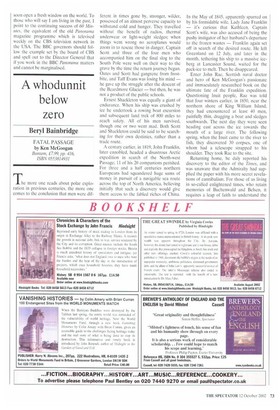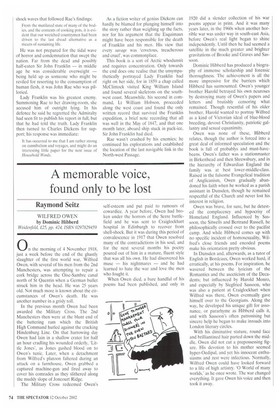A whodunnit below zero
Beryl Bainbridge
FATAL PASSAGE by Ken McGoogan Bantam, £7.99, pp. 416, ISBN 0553814931 he more one reads about polar exploration in previous centuries, the more one comes to the conclusion that men were dif
ferent in times gone by, stronger, wilder, possessed of an almost perverse capacity to withstand cold and hunger. They travelled without the benefit of radios, thermal underwear or light-weight sledges; when things went wrong no aeroplanes would zoom in to rescue those in danger. Captain Scott and three of the four men who accompanied him on the final slog to the South Pole were well on their way to the grave by the time the return journey began. Oates and Scott had gangrene from frostbite, and Taff Evans was losing his mind — he gave up the struggle after the descent of the Beardmore Glacier — but then, he was not a product of the public schools.
Ernest Shackleton was equally a giant of endurance. When his ship was crushed by ice he undertook a rowing boat excursion and subsequent land trek of 800 miles to reach safety. All of his men survived, though one or two went mad. Both Scott and Shackleton could be said to be searching for their own destinies, rather than a trade route.
A century earlier, in 1819, John Franklin, later ennobled, headed a disastrous Arctic expedition in search of the North-west Passage; 11 of his 20 companions perished. For three and a half centuries northern Europeans had squandered huge sums of money in pursuit of a navigable sea route across the top of North America, believing initially that such a discovery would give them access to the fabled riches of China. In the May of 1845, apparently spurred on by his formidable wife. Lady Jane Franklin — it's curious that Kathleen, Captain Scott's wife, was also accused of being the pushy instigator of her husband's departure to the frozen wastes — Franklin again set off in search of the desired route. He left Greenland on 12 July, and later in the month, tethering his ship to a massive iceberg at Lancaster Sound, waited for the pack-ice to melt. Then he disappeared.
Enter John Rae, Scottish naval doctor and hero of Ken McGoogan's passionate and immaculately researched book on the ultimate fate of the Franklin expedition. Questioning Inuit people, Rae was told that four winters earlier, in 1850, near the northern shore of King William Island, they had encountered at least 40 men, painfully thin, dragging a boat and sledges southwards. The next day they were seen heading east across the ice towards the mouth of a large river. The following spring, when the Inuit came to the river to fish, they discovered 30 corpses, one of whom had a telescope strapped to his shoulder. They took Rae to the site.
Returning home, he duly reported his discovery to the editor of the Times, and was unaware that the Admiralty had supplied the paper with his more secret revelations of cannibalism. For those of us living in so-called enlightened times, who retain memories of Buchenwald and Belsen. it requires a leap of faith to understand the shock waves that followed Rae's findings:
From the mutilated state of many of the bodies, and the contents of cooking pots, it is evident that our wretched countrymen had been driven to the last dread alternative as a means of sustaining life.
He was not prepared for the tidal wave of horror and condemnation that swept the nation. Far from the dead and possibly half-eaten Sir John Franklin — in middle age he was considerable overweight — being held up as someone who might be reviled for resorting to the consumption of human flesh, it was John Rae who was pilloried.
Lady Franklin was his greatest enemy. Summoning Rae to her drawing-room, she accused him of outright lying. In his defence he said he regretted the Admiralty had seen fit to publish his report in full, but that he had told the truth. Lady Franklin then turned to Charles Dickens for support; his response was immediate:
It has occurred to me that I am rather strong on cannibalism and voyages, and might do an interesting little paper for the next issue of Household Words.
As a fiction writer of genius Dickens can hardly be blamed for plunging himself into the story rather than weighing up the facts, nor for his argument that the Esquimaux might have been responsible for the death of Franklin and his men. His view that every savage was 'covetous, treacherous and cruel', was commonplace.
This book is a sort of Arctic whodunnit and requires concentration. Only towards the end does one realise that the unsympathetically portrayed Lady Franklin had right on her side, for in 1859 a chap called McClintock visited King William Island and found several skeletons on the southwest coast. Meanwhile, his second in command, Lt William Hobson, proceeded along the west coast and found the only written record that survived the Franklin expedition, a brief note recording that all was well in the May of 1847, and that one month later, aboard ship stuck in pack-ice, Sir John Franklin had died.
Rae wasn't crushed by his enemies; he continued his explorations and established the location of the last navigable link in the North-west Passage. 1920 did a slender collection of his war poems appear in print. And it was many years later, in the 1960s when another horrible war was under way in south-east Asia, before Owen's real light began to shine independently. Until then he had seemed a satellite in the much greater and brighter gravitations of Brooke and Graves and Sassoon.
Dominic Hibberd has produced a biography of immense scholarship and forensic thoroughness. The achievement is all the more impressive for the barriers which Hibberd has surmounted. Owen's younger brother Harold betrayed his own neuroses by destroying many of Owen's papers and letters and brutishly censoring what remained. Though resentful of his older brother, Harold wanted to portray Wilfred as a kind of Victorian ideal of blue-blood breeding, devout Christianity, patriotic gallantry and sexual equanimity.
Owen was none of these, Hibberd relates, though the author is forced into a great deal of informed speculation and the book is full of probablys and must-havebeens. Owen's father was a stationmaster in Birkenhead and then Shrewsbury, and in the hierarchy of Edwardian England the family was at best lower-middle-class. Raised in the fulsome Evangelical tradition of Anglicanism, Owen gradually abandoned his faith when he worked as a parish assistant in Dunsden, though he remained respectful of the Church and never lost his interest in religion.
Owen was brave, for sure, but he detested the complacency and hypocrisy of Homeland England. Influenced by Sassoon, the Sitwells and Bertrand Russell, he philosophically crossed over to the pacifist camp. And while Hibberd comes up with no specific incident of homosexuality, Wilfred's close friends and encoded poems make his orientation pretty obvious.
In Dunsden and, afterwards, as a tutor of English in Bordeaux, Owen worked hard, if erratically, at his poems. For inspiration, he wavered between the lyricism of the Romantics and the asceticism of the Decadents; but influenced by Harold Monro, and especially by Siegfried Sassoon, who was also a patient at Craiglockhart when Wilfred was there, Owen eventually gave himself over to the Georgians. Along the way, he developed his unique gift for assonance, or pararhyme as Hibberd calls it, and with Sassoon's often patronising but sincere help he began to make inroads into London literary circles.
With his diminutive stature, round face and brilliantined hair parted down the middle, Owen did not cut a prepossessing figure. His devotion to his mother seemed hyper-Oedipal, and yet his innocent enthusiasms and zest were infectious. Normally, Wilfred Owen could have looked forward to a life of high artistry. '0 World of many worlds.' as he once wrote. The war changed everything. It gave Owen his voice and then took it away.



































































































 Previous page
Previous page